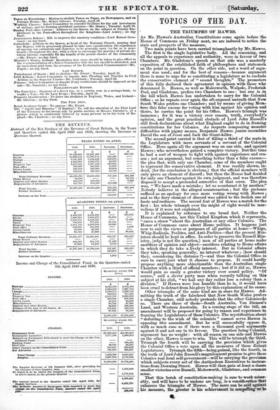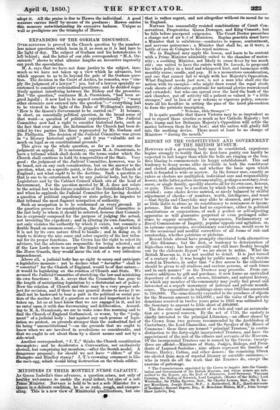TOPICS OF THE DAY.
THE TRIUMPHS OF HAWES.
As Mr. Hawes's Australian Constitutions come again before the House of' Commons on Friday next, we are induced to notice the state and prospects of the measure. Two main points have been carried triumphantly by Mr. Hawes. The first is the single legislative body. All the reasoning, and all the appeals to experience and authority, were in favour of two Chambers. Mr. G.stone's speech on that side was a masterly exposition of the established faith of philosophers and statesmen on the point in question. On the other side, not a word of argu- ment was used; and for the best of reasons-because argument there is none to urge for so constituting a legislature as to exclude the conservative element of " second thoughts." The promoters of this folly declared their agreement in opinion with those who denounced it. Hawes, as well as Molesworth, Walpole, Frederick Peel, and Gladstone, prefers two Chambers to one : but one is in the bill which Hawes has undertaken to carry for the Colonial Office ; so he repeats over again the oft-exposed untruth that New South Wales prefers one Chamber; and by means of giving Mem- bers this false excuse for voting with him against his opinion and theirs, he carries the point for his Office. Hawes's triumph was immense ; for it was a victory over reason, truth, everybody's opinion, and the great practical obstacle of Lord John Russell's still fresh declarations about whatEngland ought to do in framing constitutions for her Colonies. As respects conquering monster difficulties with pigmy means, Benjamin Hawes junior resembles David the son of Jesse and Jack the Giant-killer.
The second point carried is that of filling a third of the seats in the Legislature with mere servants of a servant of the Colonial Office. Here again •all the argument was on one side, and against Hawes ; who nevertheless gained a complete-victory. But this time he had a sort of weapon to fight with against experience and rea- son ; not an argument, but something better 'than a false excuse- the plea that, with only one Chamber, some of the members ought to represent the conservative element It was readily shown, in- deed, (for the conclusion is obvious ) that the official members will only prove an element of discord ; obvious,) then the House had decided for only one Chamber against its own judgment, and was therefore disposed to accept a pretended corrective of that error. The plea was, " We have made a mistake ; let us counteract it by another." Nobody believes in the alleged •counteraction ; but the pretence sufficed as an apology for once more voting wrong with Hawes ; and so the fiery element of discord was added to the foolish one of haste andraiihness. The second feat of Hawes was a match for the first : his whole triumph over the might of right would be mar- -venous if it were not explained. It is explained by reference to one broad fact. Neither the House of Commons, nor this United Kingdom which it represents, "cares a straw "'about the Australian or any other Colonies. The House of Commons cares about Home • politics. It happens just now to suit the views or purposes of all parties at home-Whigs, Whig-Radicals, Peelites, and Anti-Peelites-that the present Min- isters should be kept in office. In order to preserve the Russell Min- istry, (why is not the question,) men of all parties at home male sacrifices of opinion and object-sacrifices relating to Home affairs in which they do take a lively interest. But in Colonial affiiirs they take, speaking generally, no interest whatever; (how should they, considering the distance ?)--and thus the Colonial Office is sure to carry just what it chooses to propose. It could hardly propose anything more objectionable then the Australian single Chamber with a third of official members ; but if it did so, Hawes would gain as easily a greater victory over sound policy. " Of course," said a clever party man when recently talking on this subject at his club, "we had any day rather lose a colony than a division." If Hawes were less humble than he is, it would have been cruel to detract-from his glory by this explanation of its cause. Other triumphs of the same kind are in store for Hawes. Ad- mitting the truth of the.falsehood that New South Wales prefers a single Chamber, still nobody.pretends that the other Colonieslio so. There are three of them-South Australia, Van Diemen's Land, and Western Australia. In a coming stage of the bill, an amendment will be proposed for going by reason and experience in framing. the Legislatures of these Colonies. The mystification about " deferring to -the wish of the colonists " cannot serve Hawes in
opposing this amendment. But he will successfully oppose it, with as much ease -as if there were a thousand good arguments against it and not one in its favour. The question being Colonial,
argument has no weight : with all reason on one side and Hawes on the other, Hawes is sure to win. This -will be triumph the third.
Triumph the fourth will be carrying the provision which gives the Colonial Office a veto upon all the measures of' these distant Legislatures. Triumph the fifth-beinggained,like the fourth, in
the teeth of Lord John Russell's magniloquent promise to give these
Colonies real local self-government-will be carrying the provision which subjects every act 'of the Antipodean Executives to instruc- tions from Downing Street. Hawes will then gain at least a dozen smaller victories over Russell, Molesworth, Gladstone, and common sense.
That this botch of constitution-making is sure to-work miser- ably, and will have to be undone are long, is a consideration that
enhances the triumphs of Hawes. The more can be said against his measure, the greater is his achievement in compelling nsto adopt it. All the praise is due to Hawes the individuaL A good measure carries itself by means of its goodness : Hawes carries this measure notwithstanding its excessive badness. Unique as well as prodigious are the triumphs of Hawes.



























 Previous page
Previous page